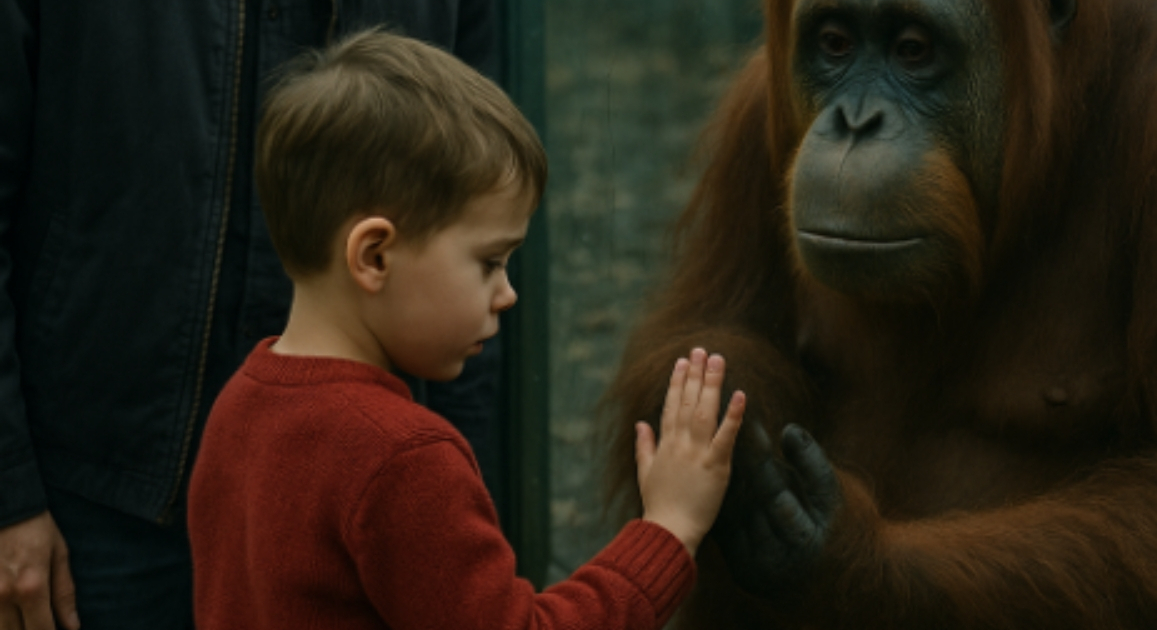The zoo smelled of wet leaves and old stone.
Andrew Peterson walked quickly, holding his four-year-old son’s hand. The boy wore a red sweater, too big for him, eyes fixed on the ground. Six months after the accident. Six months of silence.
Andrew pointed out the animals, talked, joked — but his words fell into emptiness.
Little Sam said nothing.
In the reflection of the glass, Andrew saw not just himself — she was still there, too. His wife. She would have known how to bring their son back from the darkness.
“Come on,” he said softly. “Let’s go see the monkeys.”
At the orangutan enclosure, Sam stopped. Behind the thick glass, in a shaft of pale light, sat a large female orangutan — her fur a deep rust color, her eyes dark and human-like.
The boy let go of his father’s hand and stepped closer.
“Sam, stay close,” Andrew said.
But the boy didn’t hear him.
The orangutan lifted her head. Their eyes met — and time seemed to stop.
Sam pressed his small palm to the glass.
The animal blinked slowly, then raised her own hand, placing it against his.
“Oh my God…” Andrew breathed.
A soft voice came from behind:
“Everything alright?”
“He hasn’t spoken since the funeral,” Andrew replied.
“Then maybe she understands more than you think,” said the zookeeper quietly.
Sam traced a circle on the fogged glass with his finger.
The orangutan did the same.
Andrew felt something tremble inside his chest.

“Do you… teach them this?” he asked.
“No,” the woman said. “She’s never done it before.”
Minutes passed. The crowd drifted away.
And suddenly Sam began to sing — a shaky little voice, like an old wind chime. The first sound in half a year.
The orangutan moved closer and rested her forehead against the glass.
Sam did the same.
Two faces — one human, one animal — reflected in the clear barrier, like two souls recognizing each other.
“Let him,” whispered the keeper. “Sometimes grief recognizes itself.”
The orangutan picked up a dry leaf and pressed it to the glass.
Sam gave a faint smile.
Andrew couldn’t hold back his tears.
“Daddy,” the boy suddenly said.
His voice — thin, but alive.
“Yes, son?”
“She’s sad.”
Andrew knelt beside him.
“Like Mommy, huh?”
Sam nodded.
The orangutan still sat opposite them, her eyes unblinking. Sam took a little toy car from his pocket and rolled it toward the glass, as if to share it. The animal opened her mouth slightly — almost like a smile.
“Thank you,” Andrew whispered — not knowing to whom.
When closing time came, Sam didn’t want to leave.
“She’ll be here tomorrow,” said the zookeeper. “Come back.”
“We will,” Andrew promised.
The next morning, the zoo breathed fog. The orangutan — Maya — was already waiting by the glass. Sam ran up and pressed his palm to it. She did the same.
“Hi,” he said. “I brought you a flower.”
He placed a yellow daisy on the ledge.
Maya disappeared into the back of the enclosure, then returned with a white blossom.
“That’s Mommy’s flower,” Sam whispered. “White. She loved those.”
The keeper frowned in surprise.
“Those only grow by her nest. She’s never touched them before.”
Sam pressed his forehead to the glass.
“Thank you.”
“Do you think she understands?” Andrew asked.
“Animals grieve too,” the woman said softly. “Just without words.
Maya lost her baby the same week you lost your wife. Maybe they found each other in the silence.”
“I’ll make her happy,” Sam said quietly.

From then on, every Sunday they came.
Maya always waited by the glass.
Sam told her everything — about rain, about preschool, about new friends. She listened, tracing circles on the glass with her finger.
Sam laughed again.
The therapist called it a miracle.
Andrew knew the miracle’s name — Maya.
Months later, news came: Maya was being moved to a wildlife reserve in Borneo.
“She’ll be happy there,” said the zookeeper. “Forest, freedom, sky.”
“She’ll forget me,” whispered Sam.
“No,” she smiled. “Orangutans never forget.”
At the farewell, Maya rolled a small stone toward the glass.
Sam understood — a memory.
He took a blue toy car from his pocket and placed it beside it.
“That’s for you,” he said.
Andrew pressed his hand to the glass.
“Thank you,” he whispered. “For giving me back my son.”
Maya spread her hand over theirs.
“Goodbye, Mama Maya,” Sam whispered.
The animal touched her lips to the glass — right where his hand lay.
Rain began to fall harder.
“She’s free,” Andrew said.
“She’s happy,” Sam replied.
At home, Andrew placed the white flower and the stone beside his wife’s photo.
Months later, a letter arrived:
Maya is healthy and thriving. She loves children, and often sits by the fence holding a blue stone in her hand — as if waiting for someone.
“She remembers me,” Sam said.
“She always will,” Andrew answered.
That night, Sam asked for a bedtime story — about the jungle and a family that never forgets one another.
Andrew told it.
And he always ended the same way:
“When the sun rose over the trees, the orangutan smiled at the sky — because she knew that somewhere far away, a little boy she had healed was smiling back at her.”
